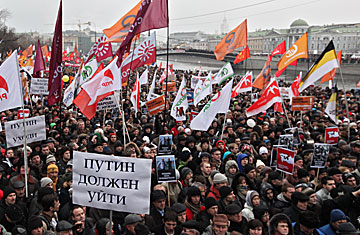
Russians stage a protest against alleged vote rigging in parliamentary elections, holding signs including one that reads "Putin Must Go Away," on Dec. 10, 2011 in Moscow
Mercenaries, goateed liberals, jackals who scavenge for money at foreign embassies in Moscow — those are some of the things Vladimir Putin has called Russia's opposition. But he's never before had to reckon with them as a significant threat to his rule. That may now have to change. On Saturday, in the biggest act of popular resistance ever to Putin's government, tens of thousands of protesters rallied across the country to challenge the results of parliamentary elections held a week ago. This time, the once and future President can't ignore his challengers or simply dismiss them with colorful epithets.
"We realize these aren't Chinese people sent here to protest," an official from Putin's United Russia party told TIME after the demonstrations. "These are regular citizens, and we have to respond to their demands." (The official asked to remain anonymous because these are "nervous times" and "no one wants to talk out of turn.") Since the wave of protests began last Monday, party officials and Putin's circle of advisers have held emergency meetings to try to hammer out a response, the official added, but have so far come up with little.
For the first time, even Putin's loquacious spokesman, Dmitry Peskov, was speechless when asked about the Saturday demonstration in Moscow, which was by far the largest since Putin rose to power 12 years ago. "The government of Russia has not yet formulated its position," Peskov said. In the upper ranks of the party, two opposing camps have emerged, according to the United Russia official. The largest group is calling for a quick and decisive crackdown, banning any further demonstrations and using force if necessary to break them up. The minority view, however, holds that the protests will fizzle out on their own if people are allowed a chance to vent their frustrations. "So far the arguments of the reasonable minority are winning out," the official added.
That much has been clear in the government's response so far. After Monday's postelection rally, which drew up to 7,000 people in the center of Moscow, authorities granted permission for a protest of up to 30,000 people on Saturday on an island in the Moskva River, a short walk from the Kremlin. Around 40,000 people showed up despite freezing temperatures and heavy snow, many of them carrying white flowers and wearing white ribbons, the symbols of what the organizers are calling the "snowy revolution." In a striking departure from tradition, all the state television channels showed footage of the rally, while the police presence was remarkably unobtrusive. No arrests were made even when thousands disobeyed orders from the city government and gathered, beforehand, near the walls of the Kremlin to march to the rally site. "Friends, you are acting like the police force of a democratic country!" one of the main organizers, Vladimir Ryzhkov, told the troops from the stage. The massive crowd responded by chanting, "The police are with the people!"
But the police were, of course, simply obeying orders, which could change quickly if the standoff is not resolved. And, considering the demands of the opposition, it is hard to imagine any quick resolution. Their first demand is for the parliamentary-election results to be annulled, as well as for a new nationwide poll to be staged. "This is completely and utterly out of the question," the United Russia official said. Such a vote would likely cost the party its majority in the parliament, which it barely managed to hold despite massive vote rigging. Without a parliamentary majority, Putin's government could face constant pressure from the registered opposition parties. Although they have only posed token resistance to Putin's rule so far — one of the parties, Fair Russia, is in fact a Kremlin creation — they could start investigating corruption in Putin's circle, block passage of the budget and break the tradition of rubber-stamping laws. Putin's legitimacy would also be deeply eroded if last weekend's vote is annulled, a risk he cannot take ahead of presidential election next March in which he hopes to win a new six-year term.
